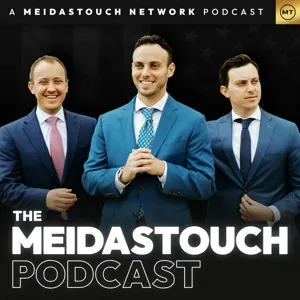Podcast Summary
Political Debate Over ESG Investing: Republicans criticize ESG policies as a violation of fiduciary duty and a push to the left, leading to state-level legislation against ESG investing in oil and gas companies.
The acronym ESG (Environmental, Social, and Governance) investing, which was previously seen as a small but growing segment of the financial sector, has become a political issue in the US. Republicans, including politicians like Senator Tom Cotton and pundits like Tucker Carlson, have criticized financial institutions for their ESG policies, arguing it's a violation of their fiduciary duty and a way to push corporations to the left. This criticism has led to a backlash against ESG, with some states like Texas passing legislation to ban financial institutions from doing business if they boycott oil and gas companies. The controversy has raised questions about the role of ESG in the financial landscape and whether it's time for a rebrand. The controversy started after President Biden's administration focused on climate change and pushed for more disclosures from companies about their emissions, which Republicans have historically opposed. ESG, with its environmental component, became a natural target for Republican criticism. In response, Texas was the first state to pass legislation targeting ESG, banning financial institutions from doing business if they boycott oil and gas companies. The controversy highlights the growing political divide over ESG and the challenges it presents for financial institutions.
States' control over investment strategies of financial institutions managing their funds: States can switch financial institutions managing their pension funds due to ideological differences over ESG policies, highlighting the tension between financial returns and political leanings.
The relationship between states and financial institutions like BlackRock goes beyond just cash management. Financial companies often manage large pension funds for states, and this outsourcing of money management can lead to controversy when the investment strategies of these companies, such as their approach to Environmental, Social, and Governance (ESG) issues, clash with the political leanings of the states. For instance, South Carolina's Republican Treasurer, Curtis Loftus, has expressed concerns about BlackRock's ESG policies and has decided to switch to Federated Hermes for managing the state's cash. This shift highlights the tension between states' desire for financial returns and their political ideologies. Despite this, the average teacher or state employee may not be aware of who manages their retirement savings, as the relationship is handled at the state level. The legislation in question aims to give states more control over how their money is invested, particularly in relation to companies involved in the fossil fuel industry.
Republicans targeting large financial institutions over ESG practices: Republicans are investigating large financial institutions, including BlackRock, over their ESG practices, a shift from their historically pro-business stance.
Republican state officials and attorneys general are increasingly targeting large financial institutions and asset managers, including BlackRock, over their Environmental, Social, and Governance (ESG) practices. This shift is significant because it goes against the Republican party's historical stance of advocating for less regulation and government involvement in business affairs. The investigations into Goldman Sachs, JPMorgan, and other major banks and asset managers, like BlackRock, over their ESG practices, are a reversal of what was expected from the Democrats. Larry Fink, the CEO of BlackRock, which is the world's largest asset manager, has been a vocal advocate for climate change concerns, making him a prime target. The scrutiny has caused reputational damage to BlackRock and other firms, but they have been pushing back aggressively. Despite this, it remains unclear what the Republicans hope to achieve through these investigations.
ESG Debate Driven by Political Posturing: Political criticism of ESG practices by banks and asset managers is driving debate, but support for ESG investing as a way to evaluate risks and opportunities remains strong.
The current debate surrounding ESG (Environmental, Social, and Governance) investing is driven in part by political posturing ahead of the November elections. Some politicians are using criticism of ESG practices by banks and asset managers as a way to gain attention and appeal to certain voter bases. However, there are limits to how far this criticism will go within the Republican Party, and there is ongoing debate about the effectiveness and future of the ESG label itself. Despite the controversy, there are still strong supporters of ESG, who believe in using it as a way to evaluate companies for risks and opportunities, as well as to push for change at the boardroom level through shareholder voting. The evidence suggests that ESG investing is a legitimate approach, and it will likely continue in some form, even if the label changes.
ESG Funds: A Growing Business Focus: ESG funds prioritize environmental, social, and governance factors as their core business focus, and this trend is expected to continue. Partnering with a financial institution can provide valuable tools, insights, and solutions for capitalizing on opportunities. Flexible short-term insurance plans are available for budget-friendly coverage.
While large asset managers like BlackRock incorporate Environmental, Social, and Governance (ESG) funds into their business mix, there is a distinct group of these funds that prioritize ESG as their core business focus. This trend is expected to continue. For business owners, partnering with a financial institution like Bank of America can provide valuable digital tools, insights, and solutions to help capitalize on opportunities. Meanwhile, UnitedHealthcare offers flexible short-term insurance plans for those seeking budget-friendly coverage for less than a year. These are just a few of the insights shared in the podcast "Behind the Money." Whether it's investing in ESG funds or securing insurance coverage, it's essential to make informed decisions that align with your goals and needs.




